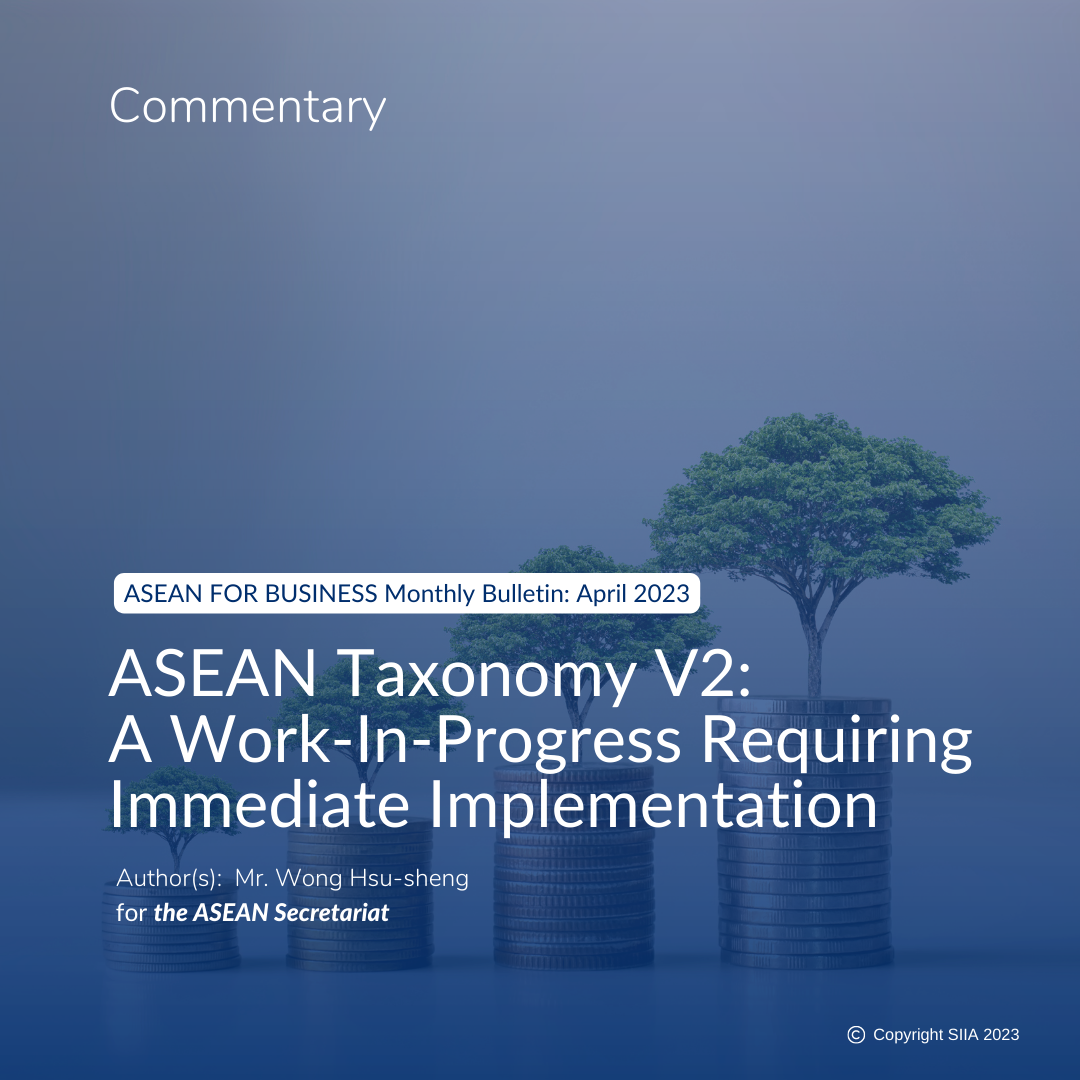Archive

In Focus: Unlocking ASEAN Taxonomy for Sustainable Finance Version 2
Green Taxonomy plays an important role in driving investments towards the Green Economy and supporting environmental protection and management efforts. ASEAN countries have developed their national taxonomy to facilitate a just transition towards a sustainable economy. The ASEAN Taxonomy for Sustainable Finance Version 2, launched by the ASEAN Taxonomy Board, provides an overarching guide to foster SustainableFinance adoption by diverse users.
Read the full article "In Focus: Unlocking ASEAN Taxonomy for Sustainable Finance Version 2" written by our COO, Hsu-sheng Wong, to learn more about what's new in the Taxonomy and how this could impact your business

Commentary: Implications for ASEAN’s Transition to Clean Energy
The war in Ukraine and rising cost of inflation have dominated the main news cycles this year, finally taking over from three years of COVID-19 and multiple lockdowns that seemed at some points to have no end in sight. These immediate crises ultimately stem from a combination of unsustainable economic practices resulting in a destructive feedback loop of Global Warming, Climate Change and biodiversity loss. Learn more about how these issues will impact the transition to clean, Renewable Energy in ASEAN in this article “Implications for ASEAN’s Transition to Clean Energy” by our COO, Hsu-sheng Wong, on Singapore Institute of International Affairs

A Catalyst for Good: Fintech Can Contribute to Achieving Sustainable Financing Goals
Against the backdrop of rising environmental, social and governance (ESG), green finance and sustainability issues, Fintech products and services that are oriented towards these areas can help provide quality data and tools to help individuals and institutions make optimal decisions. Our Fintech article in this edition of Banking Today takes a close look at the growing intersection between Fintech and ESG and the human capital skills and knowledge required to scale -up business models within the ESG and Fintech landscape.

South China Morning Post: Climate Change: China’s firms lag behind Asia, North America, Europe in net-zero targets with only 4 per cent adherence, study finds
According to a study of more than 4,000 entities worldwide tracked by researchers at NewClimate Institute, Oxford Net Zero, Energy and Climate Intelligence Unit and Data-Driven EnviroLab, only 11 out of 265 Chinese listed companies have set Net Zero targets and deadlines. The 4% adherence rate compared with the 20% in East Asia, 36% in North America and 58% in Europe, showing that China's firms are lagging behind and there is a lack of urgency almost two years after the country pledged to achieve #carbon neutrality status by 2060. In Hong Kong, listed firms are required to set green house gases emission targets. Net zero targets are encouraged but not mandatory until 2025, when the FSB Task Force on Climate-related Financial Disclosures (TCFD), is adopted. “You can imagine that the big sticks of the regulators are coming, but [in the meantime] more education and learning also need to happen before people can really embed it into their [disclosure] processes,” said Helene Li, our Co-Founder & CEO, in the interview.

LinkedIn Pulse: Net Zero - Moving from Pledges to Actions
Since the conclusion of the 26th Conference of the Parties (COP26), there has been increasing momentum towards achieving net-zero carbon emissions and stabilizing climate change. A number of big emitter countries are officially beginning the shift. In one of the most notable announcements at COP26, India shared its plans to achieve net zero emissions by 2070, and another one of the world’s most populated developing countries, China, has already pledged carbon neutrality by 2060. Other big emitters such as the EU, Brazil and the United States have formalized their pledges to reach net zero targets by 2050 and have begun to recognize the need to act now with both short term and long term goals in mind for net-zero emissions.

AsianInvestor: Assets in commodity-rich emerging economies well-equipped to weather inflation
Assets in commodity-rich emerging economies well-equipped to weather inflation. Asia’s emerging economies are likely to weather the inflation and geopolitical woes plaguing developed markets today, with assets such as long-term bonds and commodity and energy shares presenting good opportunities to institutional investors. However, Rate Hikes from the US Federal Reserve could have a profound effect on emerging ,markets, while China could have a major role in Asian markets’ post-pandemic recovery. While the US battles record-high 7.9% inflation at home and Europe is preoccupied with an energy crisis and geopolitical uncertainties, emerging economies rich in natural resources and commodities will likely survive and could even thrive. Our Co-Founder, Clarence T'ao, expressed his views at AsianInvestor on the impact of interest rate hikes on ESG investing, its impact on Asia and emerging markets and what ESG assets would be benefited and would be lost together with industry expert, Mark Nash of Jupiter Asset Management.

Market Views: How will the Russian-Ukraine crisis affect ESG investments?
How will the Russian-Ukraine crisis affect ESG investments? Some analysts believe the crisis has caused a rethink that could see a rise in investor interest in environmental, social, and governance (ESG) opportunities. Our Co-Founder & CEO, Helene Li expressed her views at AsianInvestor on how the Ukraine #crisis has affected investor position on ESG investing in Asia and emerging markets together with other industry experts, David Smith, PhD, CFA, Priscilla Lu, Dr Xinting Jia, Martin W. Hennecke, Maria Elena Drew, Evelyn Yeo and Kunjal Gala.

